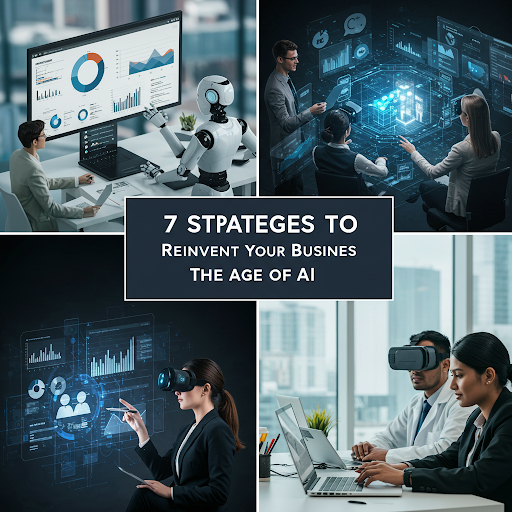Artificial Intelligence (AI) is redefining the business landscape at a rapid pace. Its ability to automate tasks, analyze data and personalize experiences is transforming the way companies operate and interact with their customers. In this new context, reinvention becomes crucial for survival and success. Those companies that adopt AI strategically will be able to not only adapt to changes, but also lead innovation in their respective sectors.
AI has deeply penetrated our lives, from our smartphones to the infrastructure of cities. Its influence is evident in process automation, informed decision making, and the ability to learn and improve over time. Some notable examples are: 1
Process automation is one of the pillars of digital transformation. AI can automate repetitive and time-consuming tasks, freeing employees to focus on more strategic and creative activities2.
Specific examples of application of Artificial Intelligence in various sectors:
Learn to create a brand that leaves a mark Get the ebook now
Manufacturing Industry:
- Implementation of robots equipped with AI to execute assembly tasks.
- Use of robots with AI for supervision and quality control in production processes.
- Using AI-powered robots to perform predictive maintenance, optimizing equipment performance.
Customer service:
- Deployment of chatbots with AI to address frequent customer queries.
- Implementation of chatbots with AI to resolve low complexity incidents.
- Use of chatbots with AI to channel highly complex queries to specialized human agents.
Marketing:
- Automation, through AI, of the segmentation of the customer base for more effective personalization.
- Automation of content creation with the support of AI.
- Automated management of advertising campaigns through AI systems.
Financial Sector:
- Automation of accounting processes through the use of AI.
- Automated detection of fraudulent activities with the implementation of AI solutions.
- Management and mitigation of financial risks through AI systems.
2. Improve decision making with AI
AI can analyze large volumes of data in real time, providing valuable insights that make it easier to make informed decisions.2.
Concrete examples:
- A marketing: AI can analyze customer data to identify purchasing patterns, predict trends, personalize offers, and optimize dynamic pricing strategies to maximize profits, using data from other companies as a benchmark.2.
- In sales: AI can predict the probability of closing a sale and identify potential customers6.
- In human resources: AI can analyze employee data to identify ideal candidates and predict performance6.
- In logistics: AI can optimize delivery routes, predict demand and manage inventory efficiently9.
3. Personalize the customer experience with AI
AI makes it possible to offer personalized experiences to customers, adapting products, services and communications to their individual needs and preferences2.
Concrete examples:
- In electronic commerce: AI recommendation systems can suggest relevant products to each customer10.
- A marketing: AI can personalize content and offers based on customer purchase history, preferences, and behavior3.
- In customer service: AI can provide personalized responses and 24/7 assistance through chatbots and virtual assistants3.
- In content curation: Companies like Twitter and Pinterest use AI to offer more relevant and engaging content to their users, improving the customer experience10.
4. Drive innovation with AI
AI can accelerate creative processes and product development, allowing companies to innovate faster and differentiate themselves in a competitive market11. The artificial intelligence sector has never been more competitive, with companies like OpenAI, Anthropic and Databricks competing for market share12.
Concrete examples:
- In design: AI can generate new design ideas, prototypes and models11.
- In research and development: AI can accelerate the discovery of new materials, drugs and technologies11.
- A marketing: AI can create new ways to interact with customers and promote products.
5. Optimize internal management with AI
AI can optimize the internal management of the company, improving efficiency and productivity in areas such as human resources, finances and operations3.
Concrete examples:
- In human resources: AI can automate candidate selection, talent management and employee training6.
- In finance: AI can optimize risk management, fraud detection and financial planning6.
- In operations: AI can optimize supply chain, inventory management and logistics6.
6. Develop new skills and abilities
AI requires new skills and capabilities in areas such as data science, machine learning, and software engineering. Companies must invest in the training of their employees so that they can adapt to new technologies and make the most of their potential.13.
Concrete examples:
- AI training programs for employees. Companies like Abridge and Harvey use AI to train employees and improve their skills. Abridge uses voice recognition and language summarization to deliver automated documentation of your doctor’s office visit, while Harvey alleviates legal monotony with its artificial intelligence technology12.
- Hiring AI experts.
- Collaboration with universities and research institutions.
7. Foster a culture of innovation
AI requires a cultural change within the organization, encouraging innovation, experimentation and adaptation to change. Companies must create an environment that promotes creativity, collaboration and continuous learning. To successfully implement the AI reinvention strategies mentioned above, it is essential that companies foster a culture of innovation14.
Concrete examples:
- Promote experimentation with new technologies.
- Create spaces for collaboration and exchange of ideas.
- Recognize and reward innovation.
Challenges of reinvention with AI
While AI offers great potential for business reinvention, it also presents challenges that companies must address: 3
- Lack of technical knowledge and training: Many companies lack the trained personnel to implement and manage AI solutions.
- High initial costs: Investment in AI technology and infrastructure can be significant.
- Ethical and legal concerns: The use of AI raises questions about data privacy, transparency of algorithms, and potential discrimination.
- Technological dependence: Overreliance on AI can increase vulnerability to technical failures or cyberattacks.
Conclusion: The future of business in the age of AI
AI is transforming the business world at a rapid pace. Companies that adopt AI strategically will be able to not only adapt to changes, but also lead innovation in their respective sectors.15.
To reinvent themselves in the age of AI, companies must take a holistic approach that combines the seven strategies presented in this article. Automating processes, improving decision making, personalizing the customer experience, driving innovation, optimizing internal management, developing new skills and fostering a culture of innovation are interconnected elements that, together, allow companies to make the most of the potential of AI.
Importantly, the impact of AI on economies will vary. Advanced economies will face greater risks, but will also have greater opportunities to reap the benefits of AI16.
The future of business in the age of AI looks promising for those companies that are willing to embrace change and make the most of the potential of this transformative technology.17.
Sources cited
1. The Impact of Artificial Intelligence Today – Master’s and Diploma Blog, accessed: March 12, 2025, https://blog.maestriasydiplomados.tec.mx/el-impacto-de-la-inteligencia-artificial-en-la-actualidad
2. Advantages and challenges of AI in companies – Esade, accessed: March 12, 2025, https://www.esade.edu/beyond/es/ventajas-retos-inteligencia-artificial-empresas/
3. Artificial Intelligence in companies: benefits, challenges and examples – Docusign, access: March 12, 2025, https://www.docusign.com/es-mx/blog/usos-de-la-inteligencia-artificial
4. Artificial intelligence and industry 4.0: examples and practical applications – – Telefónica, accessed: March 12, 2025, https://www.telefonica.com/es/sala-comunicacion/blog/inteligencia-artificial-industria-40/
5. Impact of AI in different industries: finance, health, retail and manufacturing – ISDI, accessed: March 12, 2025, https://www.isdi.education/es/blog/impacto-de-la-ia
6. AI for small businesses | US Small Business Administration, accessed: March 12, 2025, https://www.sba.gov/es/guia-de-negocios/administre-su-empresa/ia-para-las-pequenas-empresas
7. Artificial intelligence in companies: all its applications and advantages – Tableau, accessed: March 12, 2025, https://www.tableau.com/es-es/data-insights/ai/businesses
8. How You Can Use AI for Your Small Business – DreamHost, accessed: March 12, 2025, https://www.dreamhost.com/blog/es/como-usar-ia-como-propietario-de-una-pequena-empresa/
9. Artificial intelligence in industry: Uses and benefits – MESbook, accessed: March 12, 2025, https://mesbook.com/inteligencia-artificial-industria/
10. Artificial Intelligence: Business Success Stories – ADEN International Business School, accessed: March 12, 2025, https://www.aden.org/business-magazine/inteligencia-artificial-casos-de-exito-empresarial/
11. How real-world businesses are transformed with AI…, accessed: March 12, 2025, https://news.microsoft.com/source/latam/noticias-de-microsoft/como-se-transforman-las-empresas-del-mundo-real-con-la-ia/
12. Forbes AI 50 List: These are the top artificial intelligence startups, accessed: March 12, 2025, https://forbes.com.mx/lista-forbes-ia-50-estas-son-las-principales-empresas-emergentes-de-inteligencia-artificial/
13. How AI is transforming business: keys and data 2025, accessed: March 12, 2025, https://reinventatunegocio.com/ia-fortune1000/
14. 7 strategies to reinvent your business | Kopen Software | Tryton, accessed: March 12, 2025, https://www.kopen.es/estrategias-reinventar-negocio/
15. AI in Business: Trends 2025 – ADEN International Business School, accessed: March 12, 2025, https://www.aden.org/business-magazine/futuro-de-la-ia-en-negocios-tendencias-y-perspectivas-2025/
16. The global economy transformed by artificial intelligence must benefit humanity, accessed: March 12, 2025, https://www.imf.org/es/Blogs/Articles/2024/01/14/ai-will-transform-the-global-economy-lets-make-sure-it-benefits-humanity
17. The Future of Artificial Intelligence: Transforming the Business Landscape, accessed: March 12, 2025, https://newtechgroup.com/futuro-inteligencia-artificial-empresas/



